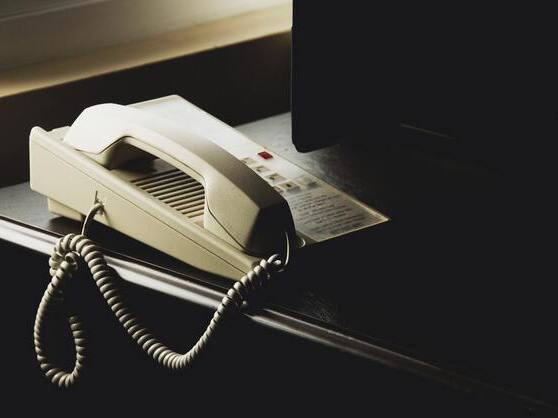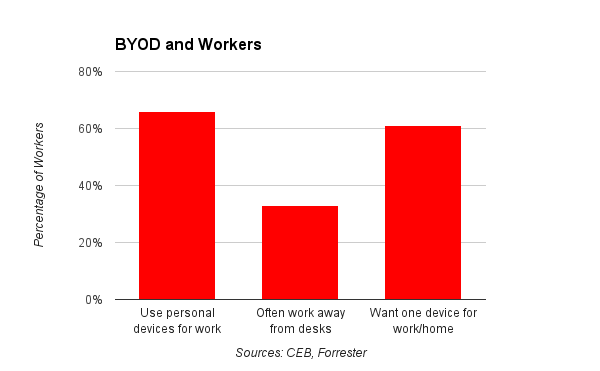The Bring Your Own Device (BYOD) trend started with the popularity of the iPhone in 2007–2009. By 2013, BYOD was considered “the new normal” among many small and large organizations. And now, it’s clear that BYOD is here to stay — and that it has put the desk phone on the endangered species list.
BYOD is the practice in which employees bring their own smartphone, tablet, or laptop to work because they prefer their devices to those their employer issues. In a recent survey, 61 percent of respondents in the U.S. said they use their personal smartphones at work, even though only 34 percent said the companies they work for had a formal BYOD policy. Another survey found that 70 percent of respondents believe desk phones will eventually be replaced by mobile phones.
Not surprisingly, Millennials are big BYOD advocates. They are the generation most likely to be glued to their smartphones, sending an average of 181 texts a day, according to Mobile Marketer. A Dimensional Research survey found that 86 percent of Millennials use their own smartphones for work and that 50 percent preferred to use their personal smartphone — even when sitting next to a desk phone.
Now that Millennials have become the U.S.’s largest demographic, according to The New York Times, they are wielding ever-more power in the workplace — a sign the BYOD trend will have legs.
BYOD isn’t just about personal preference. It’s also about practicality. According to a CEB report, 33 percent of employees who work onsite also work away from their desk — hence the need for a phone that will easily travel with them. And a Forrester Research survey found that 61 percent of smartphone users want one device for work and home.
The pros and cons of desk phones
Of course, not everyone pines for the desk phone’s demise. Many contact centers within enterprises continue to give workers desk phones. Often, it’s because this is what they’ve always done. And desk phones are what contact center agents may feel most comfortable with.
Contact centers aside, there are still plenty of knowledge workers, such as accountants, financial advisors, and data analysts, who spend most days at their desks. To them, a desk phone makes sense. Also, an office desk phone is typically simple to use. You just pick up the receiver and dial.
But that pretty much sums up the desk phone’s advantages. There are plenty of disadvantages, especially when compared to a virtual phone system that workers can access via a mobile smartphone app.
When using a typical desk phone, you aren’t likely to have access to an automatically synchronized address book. So when you make a call, you must punch in the numbers (unless you’ve put a frequent contact on speed dial).
When your desk phone rings, you’ll likely get a caller ID notification telling you who’s calling. But you don’t get context or details about the caller, such as if it’s a customer who recently made a purchase and has called before seeking help. A virtual phone system provides that context when a customer dials you, so you can be more effective in handling the call.
Installing the necessary cables and maintaining and switching desk phones can be costly and time-consuming. On average, it costs an average of $75 to $125 per line to install and manage a desk phone system, with labor accounting for about 75 percent of the costs. Wiring a desk phone to a phone system and/or to an Ethernet connection can eat up a lot of time in labor — especially in older buildings with thick walls.
Your company may need to purchase different phones with different features, depending upon the employees who need the phones. This can require spending time researching phones and features, identifying what’s most important, and managing a variety of phones.
One mobile phone for work and personal use
The Millennials are onto something. For most of us, having one smartphone for both work and personal use, especially when paired with a virtual phone system accessible via mobile app, makes a lot of sense.
For starters, most workers today already own a smartphone. The Pew Research Center estimates that 64 percent of American adults currently have a smartphone, up from 35 percent in 2011. Asking employees who own a smartphone to use a desk phone at work can create job dissatisfaction as well as hamper their productivity.
Employers can reduce telephony costs as well. Why buy smartphones for employees when they already have one and, most likely, prefer using it at work? Businesses can also save on the costs of wiring and maintaining desk phones, because it’s just not necessary.
Workers can take or make business calls anywhere they happen to be: on the road, in a hotel room, at home, while visiting a client. This makes them more productive and increases a customer’s chances of reaching the right person on their first try.
In turn, making employees more reachable prevents customers from ending up in voicemail, being put on hold, or waiting for hours for a return call — all of which risks diminishing customer satisfaction. According to an article on PRWeb regarding research conducted by Velaro, it has been established that 60 percent of consumers feel waiting on hold for even one minute is too long.
Of course, some business owners and employees want to keep a firewall between their personal and work phone lines. During their off hours, most employees don’t want customers ringing them on their personal smartphones.
As a result, some business owners may buy separate smartphones for work and personal use, for themselves and/or for their employees. Or they may purchase dual-SIM smartphones, which gives one device two phone numbers.
But having two smartphones adds costs and complexity. With two iPhones, for example, you’ve got to remember to keep both charged. As you rush off to work, you might grab your personal iPhone instead of your business one. Plus, you’ve got two cell phone plans to pay for instead of one.
The killer combo: A virtual phone system and a mobile Smartphone App
With a virtual phone system like MightyCall, small businesses can use one smartphone for their professional and personal communications. MightyCall for Android and iOS aggregates all your business communications in one app. Using the device of your choice, you can make and receive calls via your business phone number, review business call history and customer texts, even respond to customers via social media. You don’t have to log into a separate Facebook or Twitter app to communicate with customers; it’s all done in the MightyCall app.
The MightyCall phone system co-exists on your personal smartphone. When your phone rings, you’ll know right away if it’s a business or personal call. And when you don’t want to deal with business, you can change your status in the MightyCall app to “Do Not Disturb.”
Also, when an employee leaves, you don’t have to worry that they’ll take sensitive business information with them on their smartphone. All you have to do is remove their access privileges from the MightyCall system. The employee can still use the MightyCall app — but only if they set up their own account.
For reasons like these, the desk phone is on its way to a slow fade, just like the fax machine, CDs, the PDA, dial-up modems, and the slide carousel.
For more information, check out the video, “Why use MightyCall for your business?”

 BYOD is Killing the Desk Phone"/>
BYOD is Killing the Desk Phone"/> 


















